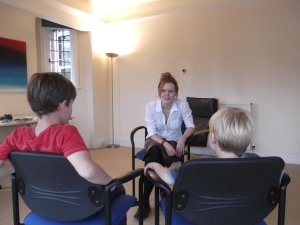Psychological therapy
Our training and experience allows us to draw on a wide range of psychological models to offer individually-tailored interventions to provide the best fit for the child, young person or family. We have provided further information about the main approaches we use, but we also draw on experience with Mindfulness, the Solihull Approach, Compassionate Mind Therapy and Systemic family therapy. While we work with any issue presenting in children, young people and families, we have a particular interest and extensive experience in working with trauma.
 EMDR: We are very experienced as using EMDR (eye movement desensitisation reprocessing) within our work. EMDR is a therapy that helps process distressing memories that have an impact on every day life. These could be memories that are causing trauma symptoms like PTSD, maintaining some avoidance like in a phobia, or causing some emotional disturbance like memories of bullying. EMDR works by recalling a disturbing image while receiving a form of sensory input at the same time, like having eye movements, auditory or tactile input. It is a very effective treatment that can work quickly. With children we adapt the original EMDR protocol to fit their developmental level, and can use puppets, toys and stories to help memories to settle and become less distressing.
EMDR: We are very experienced as using EMDR (eye movement desensitisation reprocessing) within our work. EMDR is a therapy that helps process distressing memories that have an impact on every day life. These could be memories that are causing trauma symptoms like PTSD, maintaining some avoidance like in a phobia, or causing some emotional disturbance like memories of bullying. EMDR works by recalling a disturbing image while receiving a form of sensory input at the same time, like having eye movements, auditory or tactile input. It is a very effective treatment that can work quickly. With children we adapt the original EMDR protocol to fit their developmental level, and can use puppets, toys and stories to help memories to settle and become less distressing.
Cognitive Behavioural Therapy: We are very experienced in using CBT within our work. CBT is a therapy that suggests that the meaning that is put on a situation can affect your emotions about a situation and your behaviour. By focusing on thoughts and images in a situation and seeking our evidence to see whether these thoughts are valid is a very effective way of changing emotions and behaviour. CBT has a big evidence base and is recommended in NICE guidelines for many difficulties such as depression, anxiety, and PTSD. We adapt the CBT protocol to suit the developmental level of the child or young person we are working with.
Family work: As young people and children live within families, psychological difficulties often affect and are affected by the close relationships of people around the child. We often use the parent or carer as a co-therapist to help reinforce the work we are doing in sessions. Through our conversations it might become apparent that another member of family could benefit from their own individual work, in which case we would recommend and advice how to access appropriate services, or it might be that it would be helpful for the whole family to meet to discuss patterns that might be occurring that are contributing to difficulties being maintained. If this is the case, we sometimes use more than one therapist to help us keep all the members of the family in mind.
psychological difficulties often affect and are affected by the close relationships of people around the child. We often use the parent or carer as a co-therapist to help reinforce the work we are doing in sessions. Through our conversations it might become apparent that another member of family could benefit from their own individual work, in which case we would recommend and advice how to access appropriate services, or it might be that it would be helpful for the whole family to meet to discuss patterns that might be occurring that are contributing to difficulties being maintained. If this is the case, we sometimes use more than one therapist to help us keep all the members of the family in mind.
